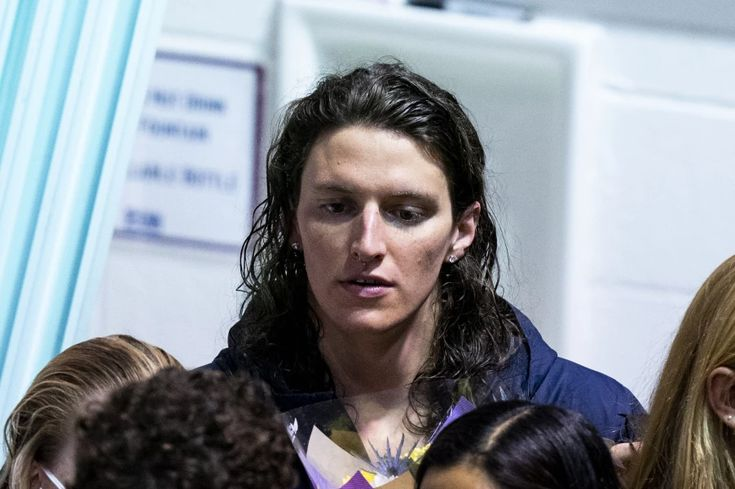
NCAA’s Groundbreaking Decision on Lia Thomas Stirs Heated Debate
In a historic move that has sent shockwaves through the sports world, the National Collegiate Athletic Association (NCAA) has ruled that transgender swimmer Lia Thomas will forfeit all of her previous titles. This decision comes in the wake of growing debates and public outcry surrounding issues of fairness and equity in women’s sports.

This decision specifically addresses the growing concerns over transgender athletes competing in women’s divisions. Lia Thomas’s participation in the NCAA women’s swimming championships and her remarkable success in those events ignited intense debates and stirred controversy across the nation.
After undergoing gender transition, Lia Thomas made history as the first openly transgender athlete to win a swimming championship in the NCAA Division I rankings. Her victory in the women’s 500-yard freestyle event at the 2022 NCAA Championships was met with a mix of accolades and harsh criticism from fellow competitors, further fueling the ongoing debate.This decision specifically addresses the growing concerns over transgender athletes competing in women’s divisions. Lia Thomas’s participation in the NCAA women’s swimming championships and her remarkable success in those events ignited intense debates and stirred controversy across the nation.
After undergoing gender transition, Lia Thomas made history as the first openly transgender athlete to win a swimming championship in the NCAA Division I rankings. Her victory in the women’s 500-yard freestyle event at the 2022 NCAA Championships was met with a mix of accolades and harsh criticism from fellow competitors, further fueling the ongoing debate.
Her performance was celebrated by many as a significant step for transgender visibility. However, some voiced concerns about the potential competitive advantages her biological differences might provide. Critics argued that her physical traits could place cisgender female athletes at a disadvantage in competition.
Despite Thomas’s ongoing participation in women’s events, the controversy only intensified. This sparked growing concerns about the integrity of the competition and whether it was fair to pit athletes who had experienced male puberty against those who had not.

Supporters of the decision argue that allowing transgender women who have gone through male puberty to compete in women’s divisions creates an inherent unfair advantage. They contend that these athletes may benefit from physiological differences—such as increased muscle mass, bone density, and lung capacity—that are more common in individuals assigned male at birth.
The National Collegiate Athletic Association (NCAA) has stated that this decision represents a major shift in the organization’s stance on the issue, reflecting the growing tension between the principles of fairness and the desire for inclusivity in sports.
By taking this action, the NCAA has shown that it is addressing the concerns of those opposed to transgender athletes competing in women’s sports, acknowledging the potential long-term impact this could have on the future of the sport. The decision reflects an effort to balance inclusivity with the integrity of competition.

Many believe that this ruling is a crucial step in preserving the integrity and fairness of women’s competitions. It is seen by some as essential for maintaining a level playing field and ensuring that women’s sports are protected from potential advantages linked to physiological differences.
Supporters of the decision believe it is a vital step in preserving fair competition within women’s sports. They argue that while it’s crucial to ensure equal opportunities and inclusivity for all athletes, maintaining competitive equity in women’s categories should also be a priority.
According to these advocates, the ruling ensures that cisgender female athletes will not be at a disadvantage in sports traditionally reserved for women, thus protecting the essence of fair competition.
Despite the support for the decision, there are still those who believe it should be reversed. Many individuals and organizations advocating for transgender inclusion in sports have voiced their dissatisfaction with the NCAA’s ruling, fearing that it could set a harmful precedent. They worry that this decision may undermine efforts to create more inclusive environments for transgender athletes in the future.

Opponents of the decision argue that stripping Thomas of her titles marks a setback in the fight for transgender rights and recognition. They contend that the focus on fairness overlooks the critical need to offer transgender athletes equal treatment and greater acceptance in competitive sports. For them, the ruling threatens to undermine efforts to foster inclusivity and respect for transgender individuals in athletic spaces.
This verdict brings up significant concerns about the future of transgender athletes in both professional and collegiate sports. As more athletes come out as transgender, the challenge of striking a balance between inclusivity and fairness is likely to remain a contentious issue. The debate on how to ensure equal opportunities while maintaining competitive equity will continue to shape the conversation in the years to come.
The question of whether regulations should be adjusted to allow transgender athletes to compete based on their gender identity or whether eligibility should be determined more by physical characteristics remains one of the most divisive issues in sports. The NCAA’s decision could serve as a precedent for other governing bodies to consider as they navigate this complex issue, potentially influencing future policies surrounding fairness and inclusivity in athletic competition.

Furthermore, this ruling provides insight into the potential future policies that regulatory bodies like the NCAA and the International Olympic Committee (IOC) may implement.
Under IOC guidelines, transgender women are permitted to compete in women’s events if their testosterone levels have remained below a certain threshold for at least one year. This approach emphasizes hormonal regulation to ensure a level playing field.
In contrast, the NCAA’s decision appears to take a more restrictive stance, underscoring the importance of preserving fairness in women’s sports, particularly considering the perceived advantages that transgender athletes may have. This more cautious approach highlights the ongoing tension between inclusivity and competitive equity in sports.
Furthermore, this ruling provides insight into the potential future policies that regulatory bodies like the NCAA and the International Olympic Committee (IOC) may implement.
Under IOC guidelines, transgender women are permitted to compete in women’s events if their testosterone levels have remained below a certain threshold for at least one year. This approach emphasizes hormonal regulation to ensure a level playing field.
In contrast, the NCAA’s decision appears to take a more restrictive stance, underscoring the importance of preserving fairness in women’s sports, particularly considering the perceived advantages that transgender athletes may have. This more cautious approach highlights the ongoing tension between inclusivity and competitive equity in sports.
Despite the decision being made, the debate remains far from settled. There is still uncertainty about whether similar rulings will be implemented in other collegiate and professional sports, as well as the broader impact this decision will have on transgender athletes in the future.
The issue is expected to continue evolving as more athletes, policymakers, and organizations contribute to the ongoing conversation about how to foster diversity in women’s sports while maintaining fairness. This ongoing dialogue will likely shape the direction of sports policy in the years ahead.
The removal of Lia Thomas’s championships marks a pivotal moment in the ongoing debate surrounding inclusiveness, fairness, and the future of sports in the era of transgender athletes. For now, this decision stands as a significant turning point.
Supporters of the NCAA’s ruling are optimistic that it will help preserve the integrity of women’s sports, while opponents fear it may undermine the rights and opportunities of transgender athletes. The conversation is far from over, and the long-term impact of this decision remains to be seen.
The removal of Lia Thomas’s championships marks a pivotal moment in the ongoing debate surrounding inclusiveness, fairness, and the future of sports in the era of transgender athletes. For now, this decision stands as a significant turning point.
Supporters of the NCAA’s ruling are optimistic that it will help preserve the integrity of women’s sports, while opponents fear it may undermine the rights and opportunities of transgender athletes. The conversation is far from over, and the long-term impact of this decision remains to be seen.